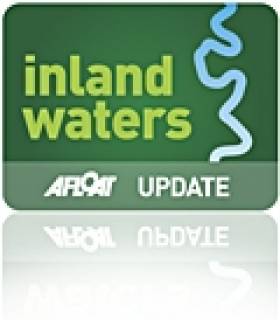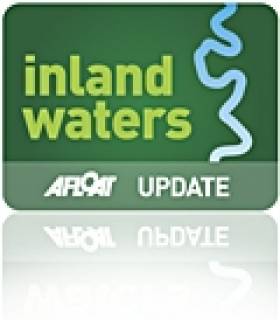Displaying items by tag: Heritage Boat Association
Join the Heritage Boat Association’s 21st Anniversary Celebrations in Ballinasloe This Week
A week of events to celebrate the 21st anniversary of the Heritage Boat Association is already under way at Ballinasloe Harbour.
All welcome to come view the barges, some of which date back to back to 1847, and explore the past of Ireland’s inland waterways with the HBA and the Inland Waterways Association of Ireland’s (IWAI) River Suck branch along with Waterways Ireland and Galway County Council.
Highlights include a heritage tour of Ballinasloe guide by local historian Sean Tully from 7pm this Wednesday 1 June. The 90-minute walking tour covers the history of the Grand Canal and River Suck, and meets at the Heron Sculpture in the harbour at 7pm sharp.
Then Saturday 4 June brings Cruinniú, a family friendly event from 1pm-5pm showcasing Ireland’s cultural heritage with arts and crafts, butter making, a flea circus and a talk on the famous Galway Hooker sailing boats.
Take a look at the historic Bolinder engine, the power plant that replaced horses on the Grand Canal barge fleet, and enjoy music in the harbour all afternoon with the Ballinasloe Town band and Bobby Kilkenny & Friends.
Later on the day, join Dr Christy Cunniffe in the marquee at 5.30pm for a historic talk on the Ballinasloe Grand Canal branch from Fannings lock to Ballinasloe, and at 6.30pm Conor Nolan will give a talk about the Heritage Boat Association.
Heritage Boat Association’s 21st Anniversary Rally in Ballinasloe Harbour Later This Month
Waterways Ireland advises masters of vessels on the Shannon Navigation that the Heritage Boat Association will be celebrating its 21st anniversary with a rally in Ballinasloe Harbour from Saturday 28 May to Monday 6 June.
Masters of vessels are advised that up to 30 heritage vessels will be moored in Ballinasloe during the 10-day rally. For more see the Facebook event page HERE.
Moored in this historic site, from Saturday May 28th to Sunday June 6th 2011, will be the largest gathering of heritage boats in a harbour, since the end of commercial traffic on the Irish inland waterways. On offer throughout the week are events to appeal to everyone in the community.
Over twenty of the Grand Canal Company (GCC) barges together with many other regenerated heritage barges and boats will be on display in the Harbour. Many of these are the old commercial boats that moved large and heavy goods along the canals, rivers and lakes, the motorways of their day. Also in the harbour will be rejuvenated wooden boats, steam tugs, steam yachts, sailing barges and other historic boats.
Each evening in the Crank House starting at 19:30, there will be a different talk on various aspects of the Shannon, her heritage and her historic boats. Entry is free and the public are most welcome.
During the week there will be daily boat trips by Silverline Cruisers with a Birdwatch Ireland Guide on board, to explore the flora and fauna of the River. Newgrange Currach will demonstrate how to build a currach and local teams will compete to build the best one. There are fishing and photographic competitions.
Shannonside Sub Aqua Club's sponsored Fin Swim will be followed by a BBQ open to the public with fun for all the family.
Heritage Boatmen Honoured with River Barrow 2011 Presentation
This year we celebrate the 220th anniversary of the opening of the Barrow Navigation. This linked the Grand Canal with the rivers Barrow, Nore and Suir, and opened up a large area of the hinterland to the great ports of Dublin and Waterford. When the canals closed to commercial traffic in the 1960s it was feared that all use of the navigation would soon cease. Indeed, non-commercial traffic did become very light, but for the vision of a few people and now, following excellent remedial work by Waterways Ireland on the Barrow Line and Barrow River, we welcome a new era for this navigation, one which will bring life and vitality once again to the waterway and the towns and villages along the system.
A hundred years ago, 1200 boatmen were engaged in the business of transporting cargo, connecting people in inland towns with those in Irish ports and in turn linking them to the great sea ports of the world. Today, many of their descendants live along our inland navigations.
Three of these great canal boats, numbers 72M, 68M and 107B, escorted by a flotilla of other HBA boats will, over the next few months, travel the entire navigation including Carlow, Waterford, Carrick on Suir, Inistioge and all points in between. The crews are anxious to meet with those whose families had connections with the commercial trade along the waterway, and perhaps even re-unite some long retired boatmen with their old boat. In particular, a gathering of the retired boatmen will take place in Graiguenamanagh on Saturday 21st May. Waterways Ireland together with the Heritage Boat Association will make a presentation to each of the boatmen to mark Barrow 2011, the celebration of the 220th anniversary of the opening of the Barrow Navigation.
The following are the expected arrival times:
Goresbridge: Saturday 30th April from 14:00
Graiguenamanagh: Sunday 8th May from 14:00
Heritage Boat Association
The Heritage Boat Association’s aspiration is to protect, promote and celebrate the floating heritage on the inland waterways of Ireland. What's remaining of our Floating Heritage provides us with a direct link to the past and includes both commercial and pleasure craft that plied the inland waterways through the different eras of the canal, lake and river systems.
If you are interested in Irish barges, canal boats, lighters, old wooden boats, steam tugs, steam yachts, sailing barges, historic boats that have ended up on the Irish inland waterways or our work, do contact us.
So - what is so interesting about Heritage Boats?
A Heritage Boat is described as being consistent with the provisions of the Heritage Act 1995, to mean a boat over 25 years old which is of significance because of it’s intrinsic construction or because of it’s association with the commercial, cultural, economic, industrial, military, political, social or other history of the country.
'Celebrating Ireland's Floating Heritage'































































